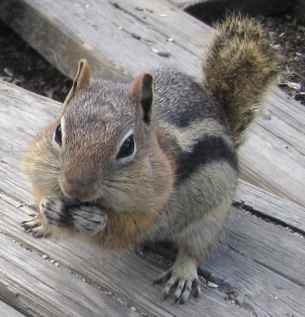Animal behaviour serves as an excellent illustration of anxiety in all of its aspects. I have already explored squirrel psychology in the past, where I discuss the effect of experience on our anxiety instinct, and I will examine goldfish psychology in my next post (stay tuned). This time it was the ever-present chipmunk that made it into my column on June 9.
Alas, to spend your entire life gathering nuts and singing irritating pop songs only to lose it all in a heartbeat to some fat man riding a bike! Sad.
Chipmunk psychology
(Source: La psychologie des petits suisses, Journal Métro, June 9, 2009)
I had an unpleasant experience once while riding my bike through Parc Jean Drapeau. It is my favourite part of the ride home from work; willow trees, flower gardens … and chipmunks, lots of chipmunks.
Over the years, I had noticed a pattern in chipmunk behaviour whenever they cross a road. It seems that if they see a car or a bike coming at them, they momentarily freeze and return to the side of the road they came from. They tend to do this even when they have crossed most of the road and it would be safer if they just kept going.
The fateful encounter
On that fateful day, a chipmunk ran across the road as I approached. He made it 90% to the other side before noticing me. Chipmunks being chipmunks, I knew that he might still decide to turn around and go back. Since he was almost completely across, I assumed he would just keep going if I gave him the greatest sense of safety by steering toward the farther side of the road. “Stay where you are, Little Chippy,” I thought to myself, “I’ll give you lots of room.”
Alas, his instinct to return to safety took over and he turned back. Our meandering lifelines crossed at that place and time and only one of us emerged. I skidded briefly as my wheel passed over poor Chippy. His body wrapped around my wheel and hung on until it hit the fork and released. For a brief moment, his lifeless body flew alongside me before hitting the pavement with a sound reminiscent of Wile E. Coyote hitting the canyon floor. The image of his body, looking like a water-filled balloon pinched in the middle, still pains me.
Anxiety protects us…most of the time
The story of Little Chippy illustrates an interesting competition between the emotional and rational parts of our brains. Anxiety, produced in our emotional centers, normally protects us by making us run away from danger and seeking the safety of familiar surroundings. This is what made Chippy try to return to where he came from.
Our more developed cerebral cortex, which learns things and observes patterns, would teach us that taking the shorter path to safety is the better option in this particular case. Unfortunately, when faced with an emergency, there is no time to think and our protective emotions must take over. They are very effective in saving us in the vast majority of situations…but certainly not all of them. For that poor chipmunk, his protective instinct actually got him killed that day.
Sorry about that, little guy, but you should have used a different part of your brain!
Tagged as Anxiety, fight or flight, survival instincts.
Posted in Anxiety.
Posted on 27 Jun 2009



